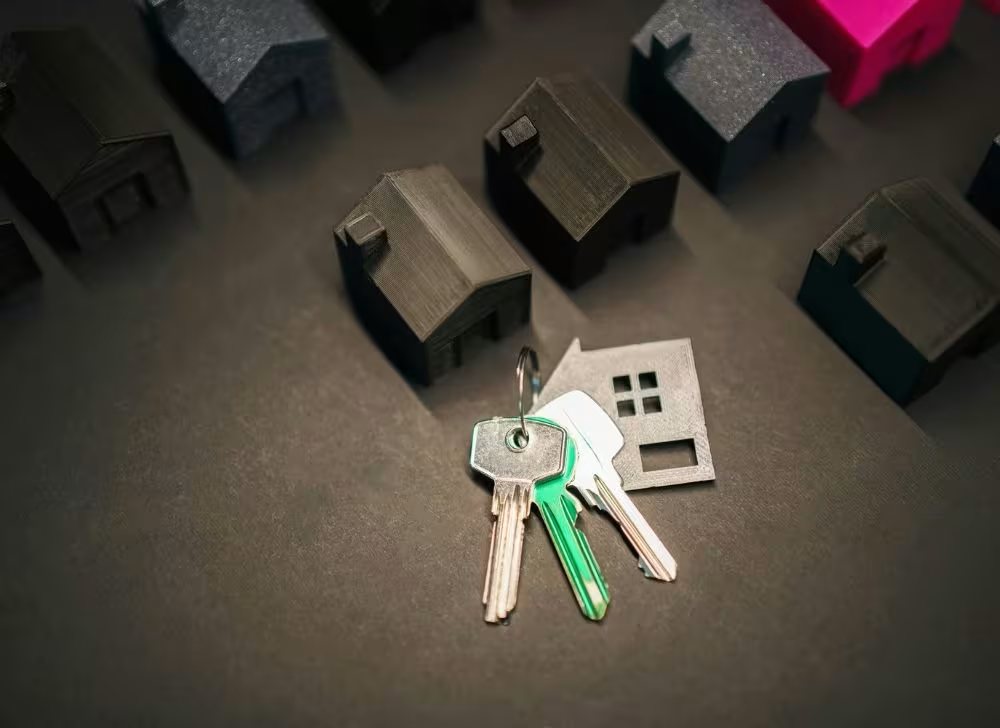Your offer on a home just got accepted - exciting, right? But before you start measuring curtains or picking paint colors, there’s still a long road ahead. According to ICE Mortgage Technology, as of December 2024, it takes an average of 44 days to reach the finish line. That’s a month and a half of paperwork, inspections, and approvals before you get the keys.
During that time, sellers want assurance that you’re committed to the deal. The last thing they want is to take their home off the market only to discover the buyer isn’t serious. That’s where the Earnest Money Deposit (EMD) comes in. It’s a small percentage of the purchase price that you put down as a show of good faith. For the seller, it’s proof you’re committed. For you, it’s a key step toward locking in your future home.
In this guide, we’ll break down what EMD is in real estate, why it matters, how much to expect, and how a partner like Altgage can make this step easier and more affordable.
What is an Earnest Money Deposit?
An Earnest Money Deposit is like a promise handshake - but with actual money. It’s a sum the buyer puts down to show they’re committed to buying the property. Think of it as a “good faith” payment that tells the seller, “I’m serious, and I’m not going to back out for no reason.”
While the amount varies, the amount of earnest money deposit is determined by factors like the home’s price, the local market, and terms agreed upon in the purchase contract. In competitive markets, offering a higher EMD can even make your offer stand out.
Facts about EMD:
- Typically ranges from 1-3% of the home's purchase price
Must be deposited within 1-3 business days after offer acceptance - Gets applied toward your down payment or closing costs at closing
- Held in escrow by a neutral third party (title company or real estate brokerage)
- Refundable under specific contract contingencies
.avif)
Why is Earnest Money Deposit Important in Real Estate?
Without an EMD, offers could be made and abandoned without consequence, leaving sellers frustrated. For the seller, an EMD is security; for the buyer, it’s a way to show commitment.
Here’s why it matters:
- Shows Seriousness: Sellers want to know buyers aren’t wasting their time.
- Reserves the Property: Once the seller accepts your offer and EMD, the home is taken off the market.
- Part of Your Down Payment: The EMD isn’t extra - it’s applied toward your closing costs or down payment.
At Altgage, we believe in making every step of the mortgage process transparent - including understanding your EMD. We help our clients prepare for these costs so there are no surprises later.
How Much Earnest Money Do First-Time Homebuyers Need?
National Averages vs. Market Reality
While national averages suggest 1-3% of the purchase price, your local market conditions significantly impact the actual amount needed:
Texas Markets:
- Austin: 1.5-2.5% (competitive market, $4,500-$7,500 on $300k home)
- Dallas-Fort Worth: 1-2% (moderate competition, $3,000-$6,000 on $300k home)
- Houston: 1-2% (buyer-friendly market, $3,000-$6,000 on $300k home)
- San Antonio: 1-1.5% (affordable market, $3,000-$4,500 on $300k home)
Florida Markets:
- Miami-Dade: 2-3% (highly competitive, $6,000-$9,000 on $300k home)
- Tampa Bay: 1.5-2.5% (growing market, $4,500-$7,500 on $300k home)
- Orlando: 1.5-2% (tourist/investment demand, $4,500-$6,000 on $300k home)
- Jacksonville: 1-2% (moderate market, $3,000-$6,000 on $300k home)
Expansion Markets:
- Colorado (Denver): 2-3% (competitive mountain market)
- California (major metros): 3-5% (extremely competitive)
- Massachusetts (Boston area): 2-3% (competitive Northeast market)
When Does Earnest Money Need to Be Deposited?
In most cases, earnest money is to be deposited within 1–3 business days after the seller accepts your offer. The exact timeline is usually stated in your purchase agreement.
Pro tip: Always make sure you know when earnest money needs to be deposited so you don’t risk violating the contract terms.
How Much is the Earnest Money Deposit?
Well, there’s no single answer - it varies by location, market conditions, and the value of the property.
There’s no fixed amount for an Earnest Money Deposit, but it typically ranges between 1% and 3% of the home’s purchase price. For instance, on a $300,000 home, 1% would be $3,000. In competitive housing markets, buyers often choose to put down a higher amount, sometimes between $5,000 and $10,000 or more, to make their offer stand out and show the seller they’re serious.
Is Earnest Money Deposit Refundable?
One of the most common questions buyers ask is: Is the earnest money deposit refundable?
The answer is - it depends.
You can usually get your EMD back if:
- The seller doesn’t meet the agreed conditions.
- You back out for a valid contingency reason (like financing falling through or inspection issues).
You might lose it if:
- You walk away from the deal without a contingency.
- You fail to meet contract deadlines.
Proof of Earnest Money Deposit
Sometimes, a seller may request proof of earnest money deposit to verify that you have the funds available. This proof can be as simple as providing a recent bank statement showing the required amount or sharing a copy of the check or wire transfer confirmation. Having this documentation ready can help speed up the process and give the seller added confidence in your offer.
At Altgage, we guide our clients on how to prepare and present this proof seamlessly, ensuring there are no delays or hiccups in their home-buying journey.
Can You Get a Loan for Earnest Money Deposit?
You might wonder - can you get a loan for earnest money deposit?
While most buyers use their own savings, some use personal loans or gift funds from family. However, the source of the money must be documented for the mortgage process.
Acceptable Sources:
- Personal savings (most common)
- Gift funds from family (properly documented)
- Sale of assets (stocks, other property)
- Personal loans (with proper disclosure to the lender)
Mortgage Lender Requirements:
- All EMD sources must be documented
- Gift letters are required for family contributions
- Personal loans affect debt-to-income calculations
- Seasoning requirements for funds in the account
Altgage helps clients explore flexible mortgage options and down payment grants that can free up personal savings - making it easier to cover your EMD.
.avif)
What Happens if the Buyer Does Not Deposit Earnest Money?
If the buyer doesn’t deposit the EMD on time, the seller can:
- Cancel the contract
- Open negotiations with another buyer
- Potentially take legal action for breach of contract
In simple terms, if you miss the EMD deadline, the seller can walk away, accept another offer, or even pursue legal action. Missing this step could cost you your dream home — so don’t delay.
Protecting Yourself:
- Set calendar reminders immediately after offer acceptance
- Coordinate with your agent and lender on deposit logistics
- Have backup funding sources identified
- Understand your specific contract timeline requirements
Altgage: Your Partner in a Smooth Home-Buying Process
Altgage believes buying a home should be exciting, not overwhelming. Alongside offering smart, affordable mortgages, we give our clients access to wholesale rates with no junk fees and even down payment grants. That means more of your hard-earned money stays in your pocket - whether you’re covering your EMD or other closing costs.
Understanding what an EMD is and why it matters can save you stress and keep your home-buying process on track. From knowing how much to deposit to protecting your refund rights, being informed is your best advantage.
Frequently Asked Questions
How much earnest money do first-time homebuyers typically need?
First-time buyers typically put down 1-2% in balanced markets, but competitive areas like Austin, Miami, or Denver often require 2-3% to compete effectively. Calculate $3,000-$9,000 for a $300,000 home depending on your market.
Is earnest money deposit refundable if I can't get financing?
Yes, if you have a financing contingency in your contract and make good faith efforts to secure a loan. Most contracts provide 21-30 days for mortgage approval. Your EMD is protected if the lender denies your application through no fault of your own.
When do I pay earnest money after my offer is accepted?
Most contracts require earnest money deposit within 1-3 business days after seller acceptance. Texas typically allows 3 days, while competitive Florida markets may demand immediate or next-day deposit. Check your specific contract terms.
What's the difference between earnest money and down payment?
Earnest money is part of your down payment, paid early to secure the contract. If you're putting 5% down ($15,000) and pay 1.5% earnest money ($4,500), you'll need an additional $10,500 at closing plus closing costs.
Where is my earnest money held during the contract period?
Your EMD goes into an escrow account managed by a neutral third party - typically a title company in Texas or real estate brokerage in Florida. The funds remain protected and earn minimal interest until closing or contract termination.
.avif)




